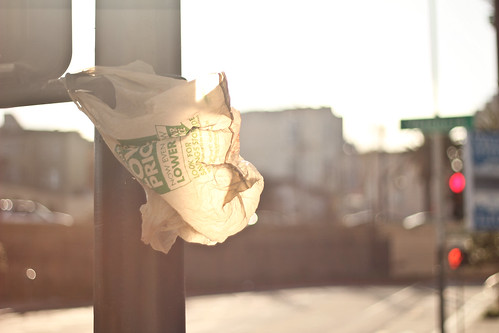
Retail customers in San Francisco will soon have another change to add to their purchase if they want a bag to carry home their goods.
In an effort to be more environmentally friendly, the San Francisco Board of Supervisors will implement an ordinance that will eradicate the use of plastic checkout bags, charge customers 10 cents to provide paper bags and impose penalties on retailers who continue to use plastic bags starting October 2012.
Plastic checkout bags were previously banned in large chain supermarkets and pharmacies five years ago due to the large quantities of plastic bags those stores distributed to customers. The previous ban is believed to have drastically diminished the number of plastic bags in landfills and in the bay, and the updated ban will abolish the use of plastic bags in all retail stores.
San Francisco was the first city in the country to ban plastic checkout bags. Since then, several cities nationwide have followed suit and banned plastic bags completely. San Jose banned them earlier this year, while Alameda and Humboldt counties are currently working on passing their own legislation. As the city that started the movement, San Francisco hopes to catch up with this new legislation.
City officials want this new legislation to promote recycling paper and compostable bags and encourage consumers to use reusable bags. They want this ordinance to eventually eliminate paper bags altogether as part of the zero waste goal, which aims to eliminate all waste in San Francisco by 2020 though recycling, composting and passing legislation to diminish waste
Supervisor Christina Olague said this legislation would dramatically reduce the impact of hundreds of millions of bags that are affecting the city.
“These bags end up as litter in our streets, as trash in our bay that harms marine life and damages aquatic ecosystems,” Olague said.
David Rantisi, who works at Tropicana Liquor Market, said there would still be waste in products customers use and don’t recycle or end up throwing on the street.
“There is waste in every product,” Rantisi said.
San Francisco resident Diana Canas admits she owns reusable bags, but doesn’t think to use them regularly enough. She believes this new legislation would force others like her to use them.
“There are plastic bags all over the street,” Canas said. “They are not reusable, at least not anymore.”
The San Francisco Department of the Environment will continue reach out to merchants during the next seven months to facilitate the transition. They will provide multi-language information about the legislation to retailers, employees, and consumers. They plan to provide merchants with lists of vendors that distribute recyclable, compostable or reusable bags.
Also as part of the outreach campaign there will be a reusable bag giveaway program to help promote the use of reusable bags to those families who may be affected by the additional cost from this legislation.
“The Department of the Environment has set aside $20,000 to invest in helping those in need as well as the community at large,” said Melanie Nutter, director of the department.
Some residents agree that the ban will help with waste but they are hesitant about the additional fee.
“We already have a hard economy,” said Heydy Mejia, a resident of San Francisco who thinks the new charge will further hurt consumers who are struggling financially.
Mejia said she owns and uses reusable bags when she shops at larger grocery stores. She frequently goes to smaller markets on a whim and does not bring her reusable bags with her. With the new ordinance she would have to carry her reusable bag with her at all times.
“I’d rather bring (my own bags) than get charged for a bag I don’t need,” Mejia said.
Olague said implementing a charge is the only effective way to change consumer’s behaviors about using reusable bags. She said the 10-cent charge would reduce bag use and will reduce cost for retailers if they have to provide fewer bags to consumers.
The new ban will have some exceptions. Plastic bags used to hold produce, meats and smaller items such as candy, and bags used to take left over food home from restaurants will not be banned for sanitary reasons as well as convenience. An exception for those customers purchasing large items will be made because there are no paper bags large enough to carry certain items. Bags used for garments at dry cleaners will not be banned.
There will be a fine for those retailers who continue to use plastic bags once the ban is implemented. The first offense will cost retailers $100, second offense $200 and $500 for any additional violations.
The Department of the Environment is encouraging merchants to use up their stock of plastic bags before they are banned. They will make exceptions with merchants who still have large quantities of plastic bags when the ban goes into effect so those merchants do not lose money.



